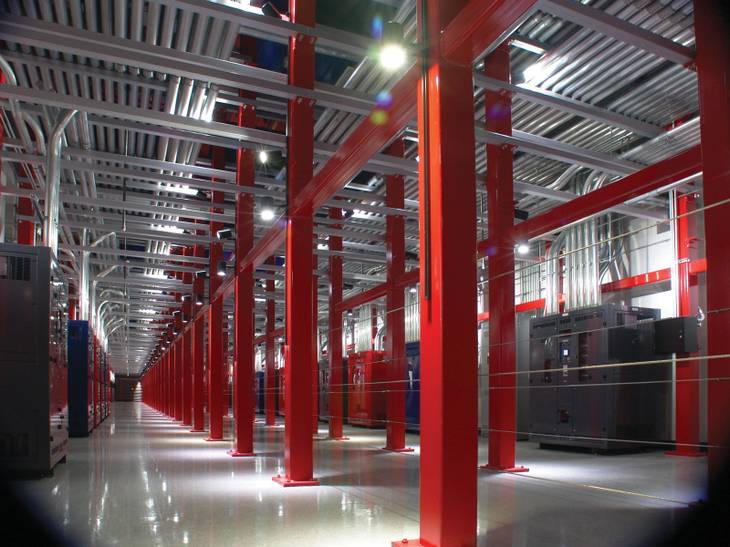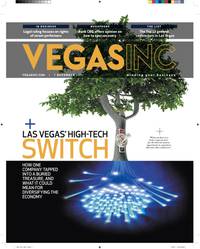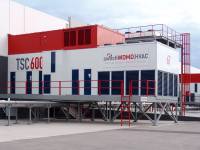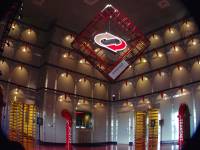For all the talk of economic diversity, consider that there is a nondescript warehouse in town with contents so vital to the operations of American businesses and government that it is protected by guards armed with assault rifles. It has nothing to do with tourists looking for a place to gamble, and everything to do with a world connected by computers.
Inside this building, Fortune 500 companies tap thousands of fiber optic lines that run beneath Las Vegas, linking the city to a national network of Internet and data carriers, providing a level of connectivity unmatched nationwide.
Built more than 10 years ago, in an era when money for such ambitious projects was easily available, the network of fiber was developed by Enron in an attempt to turn bandwidth into a commodity.
Enron is long gone, having collapsed in 2001. But the fiber system it left behind here has been characterized as a buried treasure by those familiar with it.
They describe the infrastructure as the backbone of a quietly emerging high-tech business sector in Southern Nevada — a tool that could help Las Vegas diversify its economy while reducing its reliance on the traditional staples of tourism, gaming and construction.
Already, the network has provided a launchpad for one thriving enterprise — Switch, a data-storage company that snapped up the infrastructure after Enron went under and has become a global leader in its field.
“This is a really unique asset. I don’t think it will ever be repeated,” said Jason Mendenhall, Switch’s executive vice president of cloud computing. “Even now, to get that much connectivity into a physical facility, the costs would be astronomical.”
Now that the system has been tapped, Mendenhall and others in the Las Vegas community say the growth potential in high tech is enormous.
But getting the most out of it, they say, will require help from local and state governments, the higher education system and the business community to push the fledgling industry forward and potentially transform the region’s economy.
PLUGGING IN
Switch is certainly leading the way — capitalizing on the connectivity of Enron’s fiber optic lines by building data centers where information can be stored by national and international tenants, including the United States government.
Switch’s headquarters — south of Interstate 215 in a nondescript office park near Decatur Boulevard — is guarded by high walls and electronically controlled gates.
Physical security is crucial for the company due to the sensitivity of its government contracts. Guards monitor global terrorist activity inside the command center, and visitors must surrender their identification before entering.
The windowless building is a maze of hallways awash in the company’s signature colors of red, blue and gray. Doors to private rooms require key-card access. Inside those rooms, thousands of cabinets of computer servers store data from companies worldwide.
Switch does not provide the physical hardware that stores companies’ data. Instead, it sells security, unmatched connectivity through its fiber optics, cooling technology touted to be 10 years ahead of the rest of the industry, and a 100 percent guarantee that its clients’ operations will never go offline.
The patented cooling technology was designed by Rob Roy, the company’s visionary founder. It allows companies that utilize Switch’s services to install high-density servers that would normally generate too much heat for other commercially available data centers.
Switch links to more than 25 telecommunication providers’ networks, allowing its customers to route their data anywhere in the country.
The business still requires an extraordinary amount of electricity to keep the servers cool — as much as the Venetian, Wynn and Bellagio combined — which is a drawback in the desert. However, the low likelihood of earthquakes and such severe weather as tornadoes or hurricanes provides a safe, stable environment that more than offsets the heat.
In the 11 years since it opened, Switch’s operations have grown to encompass an entire technology ecosystem, branching out into providing solutions for cloud computing (in which software and storage are accessed through a web browser), an area that will play a crucial role in the future development of the Internet.
The demand for the company’s services has driven it to continued growth even during the local economy’s downturn. It recently announced a 600,000-square-foot expansion of its campus that will more than double its footprint.
Switch says the $400 million expansion — the largest active building project in the state — will create approximately 3,000 temporary construction jobs and add hundreds of permanent engineering and maintenance jobs to its current total of about 120 employees in an area struggling with a 13.6 percent unemployment rate.
But the company’s potential to affect the region’s economy expands far beyond the walls of the six data centers it currently operates.
ECONOMIC DRIVER?
Companies have either moved offices to Las Vegas or relocated employees to the city to be closer to the data stored by Switch.
One recent morning on Switch’s campus, a team of eBay employees huddled around a table in a cage containing hard drives and servers. Down the hall, employees of the Fox Broadcasting Company worked in a room filled with television screens. Switch’s unparalleled connectivity and data hosting capabilities led the company to move its master control center to Las Vegas. From there, it sends its programming over the fiber network to 37 metropolitan markets nationwide.
Bringing many of the world’s leading companies and their data to Las Vegas is one of the key ways Switch is laying the groundwork for a technology economy, Mendenhall said.
“The reason why hospitality innovations occur on the Strip is because you have a large test bed,” he said. “The reasons why innovations are happening (at Switch) are for the same reason. All of these Fortune 500 companies and technology leaders, they’re here. In one place.”
Robert Lang, director of the think tank Brookings Mountain West, envisions Switch attracting far more companies and technology professionals.
Las Vegas’ technology economy is underdeveloped compared with places like California, he said, and Switch’s presence provides a competitive advantage that can be used to help grow the local market.
Lang said industries that could be fostered by Switch range from online gambling to computer-generated imagery and a center for the development of growing areas like online applications and 3D graphics software.
“What you have is a better capacity here for the Internet and an opportunity to expand on that into other industries,” Lang said. “(Switch) is not just a data center. It makes possible the next generation of computing. If you’re a start-up in cloud computing, you’re better off here.”
GAINING NOTICE
For years, Switch has largely flown under the public radar.
“The tourist crowds don’t know about this,” Lang said. “It’s one of those shocks of Las Vegas. Who knew? There’s a sense in the general community that there’s not a lot of assets here.”
Gov. Brian Sandoval, on the other hand, said at the company’s groundbreaking for expansion that Switch is proof that “Nevada is a great place for innovation.”
Switch is partnering with UNLV to build a cloud computing facility on campus to introduce students to the tools and skills that will be needed in a tech economy.
“It gives the students a rather secure playground where they can experiment with cloud computing,” UNLV President Neal Smatresk said. “We hope that by being good partners, the state and industry will say this is a good place to invest.”
Despite a $73 million cut in its budget, UNLV has committed to hiring about 10 faculty members this year in targeted growth areas, including the computing industry, he said.
But promoting technology growth in Nevada will require a larger investment, said Lang, who envisions something on the scale of what UNLV has accomplished with its hotel and resort management college and its gaming institute.
“When you have the Strip, the first thing you do is build a world-class hotel college because people will come from all over the world to go to that college,” Lang said. “Now that Switch is there, the way you sustain that advantage is you put the most intellectual power around it.”
To that end, Smatresk and Lang want to attract some of the nation’s top tech researchers and their graduate students to Las Vegas, where they can play a role in incubating technology companies.
One such model can be found in Utah, where the state invested about $70 million over the past five years to launch its Utah Science Technology and Research initiative.
USTAR, as it’s known, has leveraged those dollars to recruit 40 researchers and build facilities to support research in such areas as nanotechnology, biotechnology and medical imaging. The program has also set up regional business development offices that use small seed grants of about $40,000 to help commercialize and apply university research.
“We’re embedding business expertise with research enterprise,” said Michael O’Malley, a spokesman for USTAR.
The investment has generated $137.4 million in economic activity and led to the creation of 15 companies.
Lacking a large investment from the state, UNLV and the Clark County School District are nonetheless trying to attract students into technology careers.
The School District’s chief technology officer, Jhone Ebert, said most students have grown up in the digital age and use technology daily — and now need to learn how to use that technology effectively and responsibly.
Ebert says the district offers strong skills-based computing programs at many of its career and technical academies, and schools are focusing on reaching out to businesses to find opportunities for students to gain hands-on experience.
“We need more business community partnerships where the students can actually do internships. What we need to do is create those partnerships so the students want to stay here in Las Vegas,” she said. “I think the private sector wants to help, but they don’t know how.
“We want to build that bridge, because it hasn’t been as tight as it could be.”
The take-away, Lang said, is that the state’s leaders need to capitalize on Switch’s presence in Nevada and build on the platform of innovation the company provides — whether that means making Nevada the home for online gambling, or working to repurpose Yucca Mountain as a secure storage facility for the country’s most sensitive data.
With the right investments, there’s no telling how the industry might develop, he said.
“You don’t know where this industry is going to go. Silicon Valley started with defense contracts and ended up in software,” Lang said. “If you don’t put these assets in place and build around it, someone else will. Someone else will build a Switch and pair it with a great university. It’s worth taking an investment risk for the state of Nevada, because what else do we have?”



